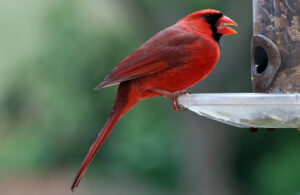 As winter approaches, you may be wondering how to attract birds to your yard. Not all birds migrate south, and with a few simple steps, you can enjoy watching local birds right from your window. One of the easiest ways to do this is by offering a variety of bird seeds. The wider the selection, the more species you’ll attract.
As winter approaches, you may be wondering how to attract birds to your yard. Not all birds migrate south, and with a few simple steps, you can enjoy watching local birds right from your window. One of the easiest ways to do this is by offering a variety of bird seeds. The wider the selection, the more species you’ll attract.
Here’s a breakdown of popular bird seed in New Jersey (NJ) and the birds they attract, with insights from the Cornell Lab of Ornithology and other expert sources.
Nyjer Seed (Thistle)
Once known as Niger seed, Nyjer seed is a favorite among finches. It’s especially popular with American goldfinches, lesser goldfinches, indigo buntings, pine siskins, and common redpolls. Despite its nickname “thistle,” Nyjer isn’t related to thistle plants, but it’s a top choice for small birds.
Shelled/Cracked Corn
Cardinals, grosbeaks, crows, ravens, jays, doves, pheasants, grouses, and quail are among the birds that enjoy cracked corn. Unfortunately, it can also attract unwanted pests like raccoons, deer, and bears. Additionally, wet corn can harbor harmful aflatoxins, so be sure to only offer small amounts at a time and clean up any uneaten corn.
Peanuts
Peanuts are a treat for many birds, including crows, jays, titmice, and chickadees. Just like corn, peanuts can attract unwanted animals and may contain aflatoxins if they get wet, so keep them dry and serve in moderation.
Safflower Seed
Safflower seeds, with their thick shells, are favored by cardinals, grosbeaks, chickadees, doves, and native sparrows. Some birdwatchers believe European starlings and house sparrows avoid safflower, but others report these birds have developed a taste for it.
Sunflower Seeds
Sunflower seeds are a favorite of many bird species. They come in two varieties: black oil and striped. Black oil sunflower seeds are easier for most birds to open, while striped seeds have a thicker shell, which may deter some birds. Popular with grosbeaks, nuthatches, tufted titmice, house finches, goldfinches, mourning doves, juncos, and woodpeckers, sunflower seeds are a versatile choice.
Fruits and Raisins
Birds like robins, waxwings, mockingbirds, Baltimore orioles, and eastern bluebirds enjoy dried fruits and raisins. These treats are especially beneficial in winter when natural food sources are scarce.
White Millet
White millet is popular with ground-feeding birds like quails, doves, towhees, juncos, cardinals, and native sparrows. However, house sparrows, cowbirds, and other blackbirds also love millet. If you’re noticing an influx of these less-desirable birds, consider replacing millet with sunflower seeds, which will attract a broader range of species.
Tips for Attracting a Variety of Birds to Your Yard
According to the Audubon Society, if you want to attract a variety of birds, it’s essential to place feeders at different heights. Some birds feed in trees, while others prefer shrubs or the ground. Also, offer a variety of seeds in separate feeders to accommodate different species.
Bird Seed Mixes from Mendham Garden Center
At Mendham Garden Center, we offer a variety of bird seed mixes tailored to attract east coast birds while minimizing waste. Here’s a look at our top-selling mixes:
- Hearty Delight: A blend of sunflower hearts, hulled white millet, peanuts, cracked corn, and Nyjer seeds.
- Super Deluxe: A premium mix with over 10 ingredients, including Nyjer seed, cracked corn, sunflower hearts, safflower seed, peanuts, and dried fruits.
- Black Oil Sunflower: Our most popular seed, loved by a wide range of birds. The thin shells are easy to open, and the high-fat content is perfect for winter.
- Woodpecker Mix: A special blend of tree nuts, sunflower hearts, peanuts, raisins, and shelled pumpkin seeds.
Specialized Bird Feeders and Squirrel Protection
In addition to feed, we also offer bird feeders designed for specific types of birds, including thistle feeders for finches, woodpecker feeders, and mealy worm feeders for bluebirds. To keep squirrels at bay, we also carry a selection of squirrel-resistant feeders, along with baffles and poles to protect your bird feed and make sure your feathered friends stay well-fed.
